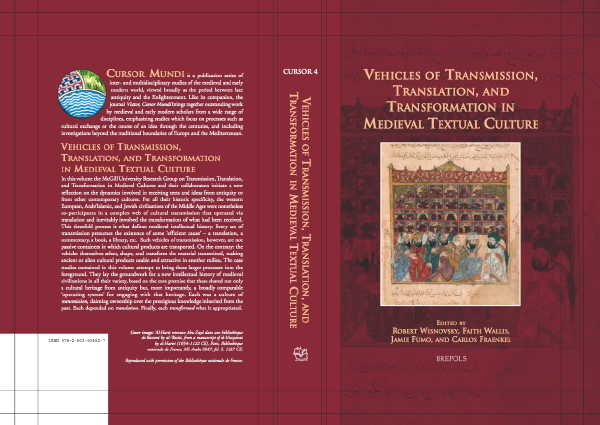Last updated: 21 February 2011
© Copyright 2007-2011,
TTT Research Group
Webmaster:
Jake Walsh Morrissey

|
Transmission, Translation, and Transformation in Medieval Cultures

The "McGill University Research Group on Transmission, Translation and Transformation in Medieval Cultures" (TTT - Principle Investigator: Prof. Robert Wisnovsky, Institute of Islamic Studies, McGill) was an FQRSC-supported équipe universitaire en émergence from 2006 to 2008, and is currently (2008-2012) an équipe universitaire en fonctionnement. Our group brings together scholars in the fields of history of science and medicine, philosophy, literature, history of art, religious studies, Islamic studies, and Jewish studies who study the processes by which the textual cultures of medieval Judaism, Christianity, and Islam re-shaped the legacies of Greco-Roman antiquity and the ancient Near East. Our team came together because of a shared perception that a major lacuna exists in our understanding of medieval textual cultures: there is no synthetic history of this period which takes as its central theme the processes by which cultural forms were transmitted from Antiquity to the Middle Ages or between medieval cultures, translated (literally and metaphorically) into the learned idiom of the recipient culture, and transformed into new cultural productions. Several important steps have been taken towards the ultimate goal of the research group, namely, the production of such a synthesis:
-
in 2007, the convening of the first interdisciplinary TTT workshop, entitled "Vehicles of Transmission, Translation and Transformation", the proceedings of which will be published by Brepols in 2011, as part of UCLA's Cursor Mundi series;

-
in 2008, the expansion of TTT from four to six members;
-
in 2009, the arrival at McGill of the first TTT Postdoctoral Scholar, Dr Keren Abbou Hershkovitz, from Ben Gurion University, Israel;
-
in 2010, the convening of the second interdisciplinary TTT workshop, entitled "Agents of Transmission, Translation and Transformation";
In addition to these highlights, significant progress has been made on the TTT's bibliographical database of scholarship relevant to our field of inquiry.
Thus far, TTT's research has thrown light on two main issues: the importance of the shared nature of ancient legacies for understanding medieval textual cultures (transmission and translation), and the need to avoid reducing medieval textual cultures to a mere vehicle of the ancient legacies by recognizing that reception is a creative cultural act (transformation). By stressing the creative aspect of reception we are contributing to the replacement of paradigms that in the past shaped the perception of medieval cultural history on both the chronological and intercultural level: (1) In terms of transmission across time, the paradigm of "the survival/revival of the classical tradition" is yielding to approaches which emphasize the agency of learned communities in creating and naturalizing the tradition. (2) In terms of transmission between sibling cultures, the instrumentalist view that limits the historic role of Islam to preserving and relaying ancient learning to Europe, has been discarded. Not only is Islam's creative development of ancient concepts better appreciated, but the complex interaction between these Islamic reformulations and medieval Christian and Jewish textual cultures, each equipped with its own acquired practices of selection and transformation, is changing the way in which this process is understood.
|


